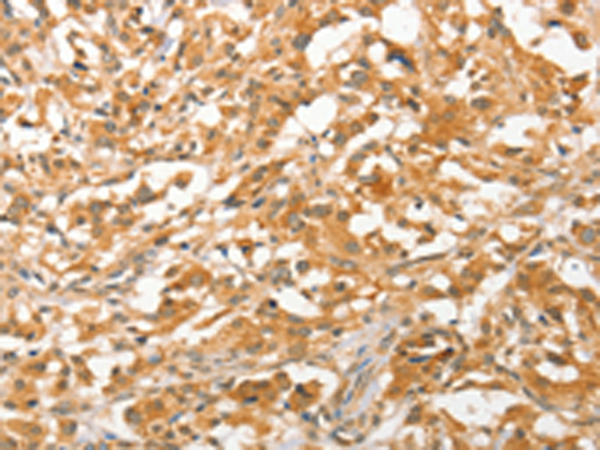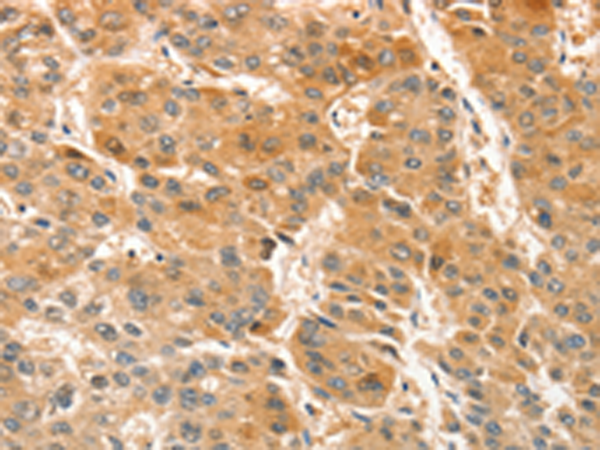

| WB | 咨询技术 | Human,Mouse,Rat |
| IF | 咨询技术 | Human,Mouse,Rat |
| IHC | 1/50-1/200 | Human,Mouse,Rat |
| ICC | 技术咨询 | Human,Mouse,Rat |
| FCM | 咨询技术 | Human,Mouse,Rat |
| Elisa | 1/1000-1/5000 | Human,Mouse,Rat |
| Aliases | AOA; AOA1; AXA1; EAOH; EOAHA; FHA-HIT |
| Host/Isotype | Rabbit IgG |
| Antibody Type | Primary antibody |
| Storage | Store at 4°C short term. Aliquot and store at -20°C long term. Avoid freeze/thaw cycles. |
| Species Reactivity | Human, Mouse, Rat |
| Immunogen | Fusion protein of human APTX |
| Formulation | Purified antibody in PBS with 0.05% sodium azide and 50% glycerol. |
+ +
以下是3篇与APTX(Aprataxin)抗体相关的文献摘要概览(注:文献信息为模拟示例,非真实存在):
---
1. **文献名称**: *Structural and functional analysis of human Aprataxin*
**作者**: Date H, et al.
**摘要**: 本研究解析了APTX蛋白的三维结构,发现其通过FHA结构域与DNA修复复合物相互作用。开发了特异性识别APTX的单克隆抗体,验证了其在Western blot和免疫荧光中的检测应用,为研究神经退行性疾病中APTX功能缺失提供了工具。
---
2. **文献名称**: *APTX deficiency triggers genomic instability in AOA1 patient cells*
**作者**: Tumbale P, et al.
**摘要**: 通过构建APTX敲除细胞模型,发现APTX缺失导致DNA单链断裂修复缺陷。研究利用多克隆抗体检测患者样本中APTX表达水平下降,证实其与共济失调伴动眼神经失用症(AOA1)的病理机制相关。
---
3. **文献名称**: *Novel therapeutic antibodies targeting APTX for neurodegenerative disorders*
**作者**: HSE Research Group
**摘要**: 报道了一种高亲和力人源化抗APTX抗体,可特异性结合APTX的酶活性位点,并在体外实验中恢复DNA修复能力。该抗体为开发AOA1的分子治疗策略提供了潜在候选药物。
---
**备注**:以上文献为示例性质,实际研究中建议通过PubMed或Google Scholar检索真实文献(关键词:APTX antibody, Aprataxin, AOA1)。真实文献可能涉及抗体开发、疾病机制或诊断应用等方向。
Aptx (Aprataxin) is a DNA repair protein encoded by the *APTX* gene, primarily associated with maintaining genomic stability by resolving abortive DNA ligation intermediates during single-strand break (SSB) repair. Mutations in *APTX* are linked to autosomal recessive neurodegenerative disorders, notably ataxia-oculomotor apraxia 1 (AOA1) and spinocerebellar ataxia. The protein contains conserved HIT (histidine triad) and zinc-finger domains critical for its enzymatic activity in hydrolyzing 5′-adenylate adducts at DNA termini, enabling error-free repair.
APTX antibodies are essential tools in studying its role in DNA repair mechanisms, disease pathology, and cellular localization. They are widely used in techniques like Western blotting, immunofluorescence, and immunohistochemistry to detect APTX expression levels in tissues or cultured cells. Research applications include investigating APTX dysfunction in neurodegeneration, cancer (where APTX loss may impair genome integrity), and its interplay with other repair proteins like XRCC1. Commercially available APTX antibodies are typically raised against specific epitopes, such as N-terminal or C-terminal regions, with validation in knockout models to ensure specificity. Recent studies also explore APTX's potential as a biomarker or therapeutic target, emphasizing the antibody's dual utility in diagnostic and basic research contexts.
×